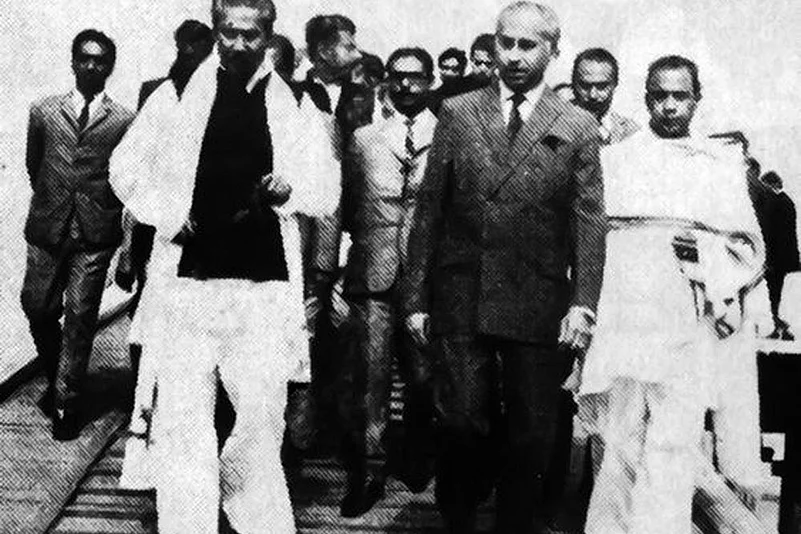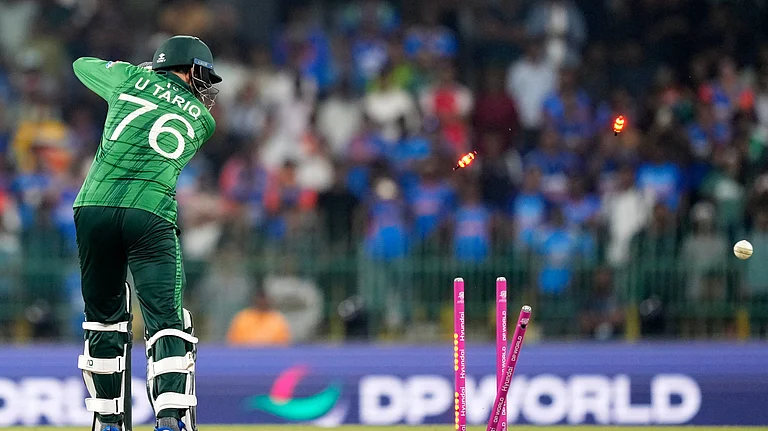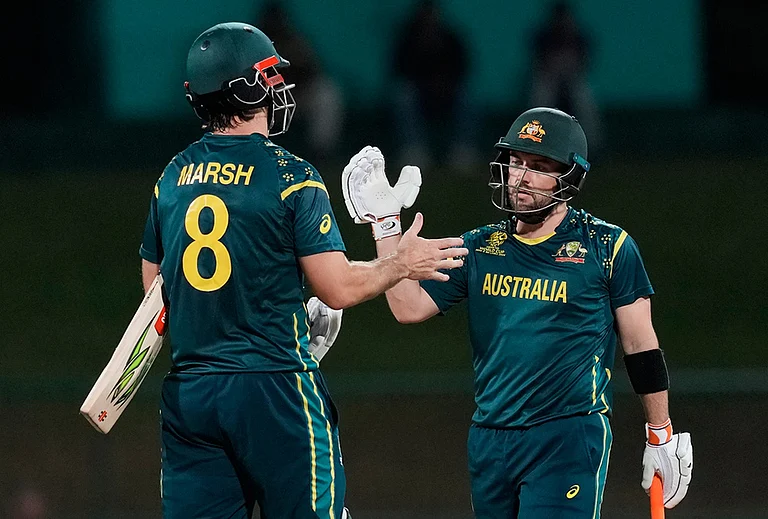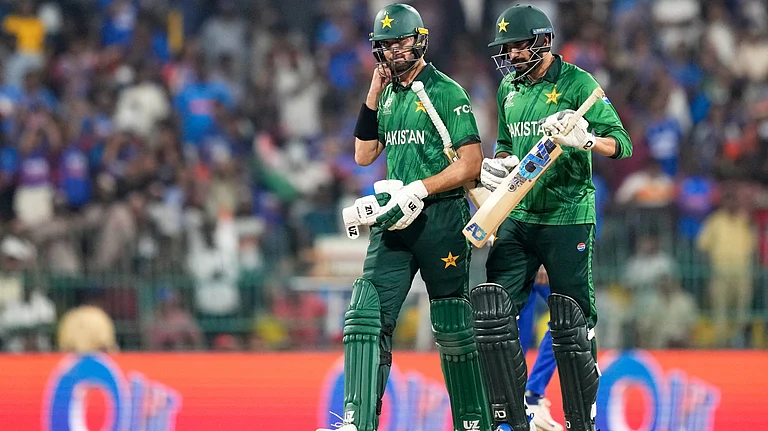In the introduction of her book, Syeda Hameed writes, “For twenty years I lived with a man I never met”. She repeats almost the same sentence while finally summarising her assessment of Zulfikar Ali Bhutto: “An extraordinary man who I never met, but with whom I have lived for almost twenty years”. Clearly, Hameed has been awestruck by Bhutto. She worked on his political biography off and on for two decades; hence, a full consideration of all facets of his complex political journey could be legitimately expected. This is sadly lacking, as is an examination of some of Bhutto’s policies and actions that particularly impacted India. However, on offer are many interesting aspects of Bhutto’s life and career which make Hameed’s work worth reading. What adds interest are the questions raised, although tangentially, on the criterion to judge great political leaders.
Bhutto was the scion of a leading Sindhi landed family. He inherited many of its feudal traits—fondness for the good life, supreme confidence, arrogance and disdain for opposing views. But he also displayed qualities that went beyond the confines of his class—intellectual depth and vigour, powers of articulation, an ability to identify with and therefore mobilise and sway the masses. Their impact was eroded though by a suspicious nature and vicious vengefulness. Thus, many contradictions combined in his varied personality, which took him to the pinnacle of power to give hope to a defeated country but which also plunged him from the execution platform. Fascinated by the elements, often at odds with themselves, in Bhutto the man and politician, Hameed sees ‘parallels’ in his life and Sophocles’s Oedipus. True, there was much drama in Bhutto’s crowded, charged and short life, but did the fault lie in him or in his stars?
Bhutto’s political career falls into four distinct parts: his induction to the Pakistan cabinet in 1958 when he was only thirty, to the split with his benefactor, Ayub Khan, in 1966; next came a period of five years when he was incarcerated for some time, established the Pakistan People’s Party and became West Pakistan’s popular mass leader; the third period saw Bhutto, after Pakistan’s decisive defeat in December 1971, become Pakistan’s president and later prime minister till, in July 1977, he was overthrown in a military coup. The last spell witnessed what Justice Muneer told one of the convicting Supreme Court judges, “You have committed judicial murder”. Zia-ul-Haq executed him in April 1979.
Hameed steers selectively through these four periods. She focuses on Bhutto’s evolution as a political leader and the development of his “political agenda based on Islamic faith, democratic polity, socialist economy and confrontation with India”. Her interest is on the ways he swept the masses of West Pakistan through his histrionics and oratory. While this is valuable in gaining an understanding of Bhutto, it is at the cost of ignoring his association with some historically crucial events. Almost his first assignment on becoming foreign minister in 1963 was to hold talks with Sardar Swaran Singh on Jammu and Kashmir. This was the only time when India and Pakistan engaged in detailed discussions on the territorial disposition of the state, but Hameed omits any mention of this engagement.
Bhutto was one of the principal architects of Pakistan’s failed 1965 war against India. Ironically, instead of being held responsible, he emerged as “a national hero”, partly because of his dramatic interventions in the United Nations as foreign minister. These acted as a salve to the disappointments of the Pakistani people, who were fed on a diet of great martial superiority. However, they had no impact on the national positions of member-states, who acted according to their interests.
Bhutto broke away from Ayub Khan for ‘ignoring’ Kashmir at Tashkent. His popularity soared because of his incarceration and his pro-poor and anti-India stance. In 1969, Ayub Khan had to quit and Gen Yahya Khan took over. He held elections in 1970. The basic faultline of Pakistan, between its East and West wings, now became decisive. Sheikh Mujibur Rahman’s Awami League was in a position to form the federal government. Bhutto went along with the army to deny this. The army launched a genocide in March 1971. Bhutto’s role through this period, which witnessed the break-up of Pakistan, is entirely dubious, but Hameed ignores it.
Pakistan’s decisive defeat in 1971 witnessed Bhutto’s finest moment. Hameed gives a fascinating account of the behind-the-scene activity that led to Bhutto becoming president after Dhaka had fallen to the Indian army. Bhutto’s speeches to the UNSC were once again a balm to an enraged and disoriented populace. Now, with the army discredited, he was the supreme leader of the country. He ruled Pakistan for almost five years, till he was overthrown by his own chosen army chief, Zia-ul-Haq, who was obsequious till he was subordinate to Bhutto. His tragic end, which Hameed focuses on admirably, should not prevent an evaluation of the years of his rule. Nor should his stoicism and refusal to personally seek mercy when it became increasingly clear that Zia, disregarding mercy appeals from world leaders, would execute him, prevent that.
As Hameed views Bhutto as a tragic hero her emphasis is on how, when he was at the pinnacle of his career, his flaws and suspicions drove him to alienate and often brutally humiliate his closest political colleagues. She principally relies on Mubashir Hasan, one of the founders of the PPP and Bhutto’s finance minister till he, like some others, resigned and left, to relate the inner workings of the Bhutto government. Hasan saw the process of Bhutto relying more and more on the intelligence agencies and the civilian bureaucracy instead of colleagues. That only insulates a leader from the people, to his and the country’s detriment.
For all this, Bhutto’s major contribution to his country was to give it hope when it was in dark despair. He had to regain Pakistan’s position in the world. He focused on negotiating with India and building ties with the larger Islamic world. Hameed asserts, “The Simla Pact was a great victory for Pakistan”. She states that Pakistan entered the negotiations as a defeated country and made no “vital concessions” for the return of the POWs or territory. This cannot be denied, but Bhutto’s obsessive animosity towards and misplaced fear of India prevented him from laying the foundations of peace and cooperation with a larger neighbour. In retrospect, this was not the act of a far-seeing statesman.
Neither Bhutto’s contribution to the development of Pakistan’s nuclear weapons programme (which Hameed does not cover) nor the triumph of gaining the sympathy of the Islamic world (which Hameed emphasises through a long description of the Second Islamic Summit, held in Lahore in 1974) could transform Pakistan as Bhutto wanted. Only true peace with India could, which he shunned. Indeed, as a democrat, he did not realise that without peace with India, Pakistan would remain a prisoner of its own army and, increasingly, extreme religious groups; true democracy would remain a distant dream.
In judging Bhutto, Hameed quotes Hasan, “Try to understand the mind of a sovereign, a man in whose name a state acts. Don’t judge his actions as ethical or unethical. When you act for the state—you are the sovereign. There are no ethics”. Earlier, she quotes Hasan on the ‘sovereign mind’ thus: “Moral considerations, personal and populist values become secondary to the pursuit of power and staying in power”. These views pave the path to tyranny, megalomania and disaster. They cannot bring forth “the tallest political figure of Pakistan, perhaps of South Asia and Islamic world”. Hameed is simply wrong in so evaluating Zulfikar Ali Bhutto.

























